National Police Commissioner General Fannie Masemola to testify before Madlanga Commission on Monday
National Police Commissioner General Fannie Masemola is set to take the stand at the Madlanga Commission of Inquiry on Monday, September 22, 2025.
Confirming the development on Sunday, Commission spokesperson Jeremy Michaels said Masemola’s testimony will be open to the public and widely accessible through various media platforms.
“We can confirm that the National Commissioner of Police, General Fannie Masemola, will testify before the Commission of Inquiry on Monday, September 22, 2025,” Michaels said.
“The public will be able to follow the hearing via livestream on the Commission’s website as well as various other radio, television, news and social media platforms.”
The hearings are being held at the Brigitte Mabandla Justice College in Pretoria, where members of the public will also be allowed to attend proceedings.
“We would also like, to remind those members of the public who want to attend the hearing that they should bring along a valid Identity Document or Driver’s Licence, and that no weapons will be permitted on the Commission’s premises,” Michaels added.
The commission, chaired by Justice Mbuyiseli Madlanga, began its hearings on Wednesday, September 17, with former acting police commissioner Lieutenant General Nhlanhla Mkhwanazi as its first witness.
Mkhwanazi questioned the motives behind the disbandment of the elite Political Killings Task Team (PKTT), suggesting the move was politically motivated and intended to protect powerful individuals.
He accused suspended Police Minister Senzo Mchunu of being “fully involved in the syndicate” behind numerous crimes and of sabotaging efforts to address political killings in the province.
Mkhwanazi told the commission that he had made multiple attempts to raise concerns with Mchunu about the task team’s disbandment, but his efforts were repeatedly ignored.
*This article was first published by IOL News







